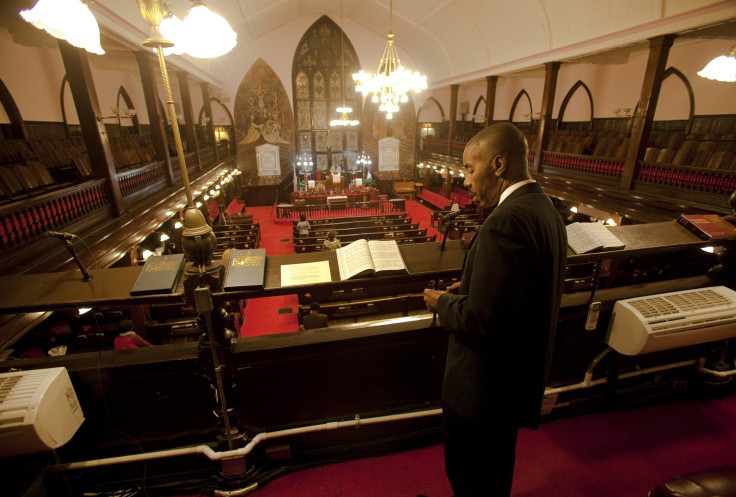Before Charleston Shooting, 'Mother Emanuel' AME Church Was Famous In Black Community

In the past 24 hours, Charleston, South Carolina's Emanuel African Methodist Episcopal Church has become many things: the scene of a hate crime, yet another example used in a presidential plea for gun control, a symbol of increasingly tense race relations in the United States. It's been broadcast live on CNN, tweeted about by Taylor Swift and discussed in hundreds of Facebook comments.
But before the tragedy and national spotlight, Mother Emanuel was Lillian Green's church. "We're like family," said the 81-year-old, who has been part of the congregation since she was an infant. "They're real friendly and welcome everybody in there."
Mother Emanuel, as it's nicknamed, was propelled into the spotlight Wednesday night when white 21-year-old Dylann Storm Roof walked into the predominantly black church, sat through an hour of small group Bible study and opened fire. The attack injured three people and killed nine, among them the Rev. Clementa Pinckney, the church's pastor since 2010 and a longtime state legislator. Roof was arrested Thursday as the nation mourned.
Mother Emanuel has long been considered a symbol of black resilience. The oldest black church in the South, it has an active membership that celebrates not only God but the community as well.
Mother Emanuel's origins date to the 1780s, when a group of black men and freed slaves came together to create a place where they could worship without discrimination. They formed the African Methodist Episcopal Church in Philadelphia, and the movement soon spread. By 1816, it had reached Charleston, where the Rev. Morris Brown established Mother Emanuel -- then called Hampstead Church -- with former followers of the Methodist Episcopal church.
The site was embroiled in controversy over the next few years. Brown and other ministers were arrested in 1818 for facilitating black services without white supervision, according to the National Park Service. Soon after, founder Denmark Vesey began planning a slave rebellion. When white landowners discovered his plans, they executed him -- and burned Mother Emanuel. The church was rebuilt, but in 1834 all-black churches were banned.
Mother Emanuel joined the Underground Railroad and held services in secret through 1865. It moved to its current location after an earthquake hit Charleston in 1886, afterward drawing civil rights leaders like Booker T. Washington and the Rev. Martin Luther King Jr.
In a statement Thursday, President Barack Obama said Mother Emanuel was "more than a church." "This is a sacred place in the history of Charleston and in the history of America," he added, going on to recognize its charitable efforts. "There is something particularly heartbreaking about death happening in a place in which we seek solace and we seek peace."
Today, the church has modernized. More than 1,100 people "like" Mother Emanuel on Facebook, where staff members have posted trivia questions about South Carolina, updates from vacation Bible school and pictures of new Eagle Scouts. In a post from 2013, they debated where to go to lunch -- "Nigel's has fried green tomatoes," a church employee wrote.
The church seems even busier when you check its website. There, Mother Emanuel advertises its college outreach committee and social media ministry. Its young adult group promotes "Esther's Closet," where members donate upscale clothing to women in need. The calendar shows praise and worship services every Monday and Thursday, Bible study and senior citizen meetings on Wednesdays and choir rehearsals on Fridays. The church also throws annual Easter and Christmas parties.
In 2013, the late pastor Pinckney said the church stands for all people being treated fairly under the law, as God sees them. "We don’t see ourselves as just a place where we come to worship but as a beacon and a bearer of the culture and a bearer of what makes us a people," he said. "But I like to say that this is not necessarily unique to us. It is really what America is all about."
Longtime member Green heads the unofficial flower guild, but it's the community that has made her stick her around for decades. Two of Green's daughters died in 2012, and the congregation took care of her while she grieved. "When anything happens to anyone, everyone is there," Green added.
It's because of all this that when a friend called to tell her the news of Wednesday's shooting, Green couldn't believe it. She asked, "Are you sure?" before turning on the TV to monitor the news. She watched it all night because she couldn't sleep, waking up every half hour to wonder if the attack had been a nightmare.
Green said she feels numb for now, but she knows Mother Emanuel is strong enough to recover. "We'll bounce back," she said. "We have to."
© Copyright IBTimes 2024. All rights reserved.






















